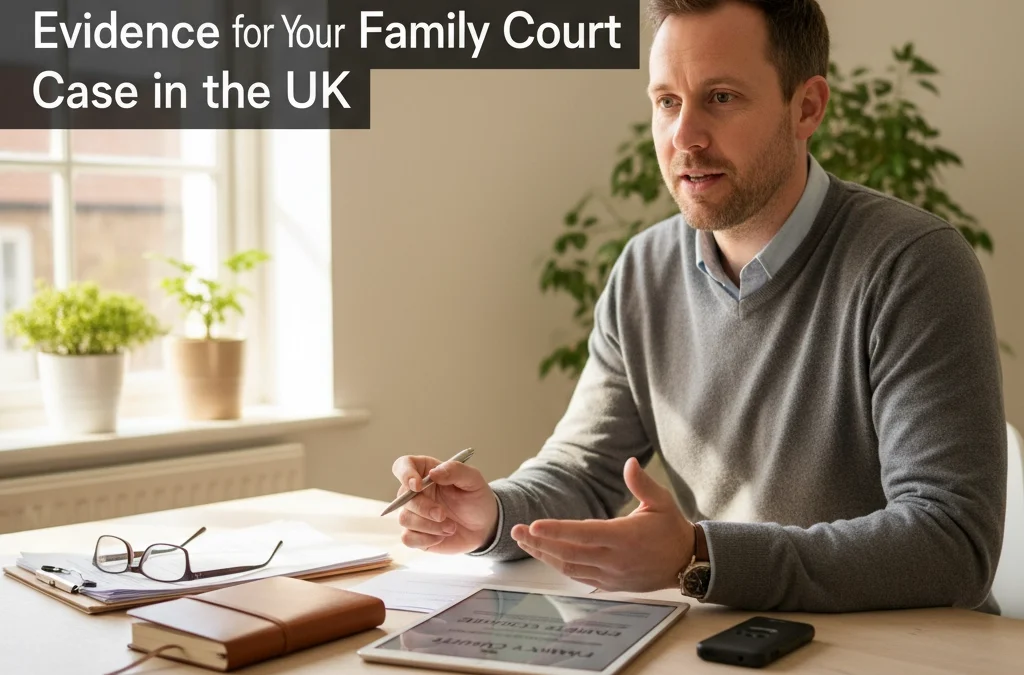Every father deserves his day in court: armed with the right evidence and unwavering confidence. When you're fighting for your parental rights in UK family courts, proper evidence collection isn't just important: it's your lifeline to justice. Join us as we empower you with the practical knowledge to gather compelling, legally sound evidence that protects your case and strengthens your position as a devoted father.
Understanding Your Evidence Arsenal
The family court system respects facts, not emotions. Your evidence tells your story when words alone aren't enough. In UK family proceedings, courts accept multiple forms of evidence that can make or break your case. Documentary evidence forms your foundation: think text messages, emails, photographs, medical reports, bank statements, and social services correspondence.
Witness testimony provides that crucial human element, while expert evidence offers professional backing in specialized areas. Remember, every piece of evidence you collect should directly support your case for being the involved, caring father you are.
The court operates under Part 22 of the Family Procedure Rules, giving judges authority to direct which evidence is needed and how it should be presented. This means preparation is everything: sloppy evidence collection can result in crucial information being excluded from your case.

Securing the Right Permissions: Your Legal Safety Net
Never cut corners when it comes to permissions. This is where many fathers stumble, and we're here to ensure you don't join their ranks. Police records and medical documentation require specific court permissions before you can access and present them.
If police have been involved in your situation, you must obtain court permission to access these records. The same applies to medical records from your GP or other healthcare providers: though typically a letter from your doctor will suffice for basic medical information.
Here's your action plan:
- Request permission at your first court hearing
- Explain clearly why each record is relevant to your case
- Follow proper legal channels: no shortcuts
- Document every permission you receive
When it comes to witness statements, court approval is essential. Choose witnesses who have directly observed relevant events, maintain credibility, and won't unnecessarily take sides. Quality over quantity: one strong witness beats five weak ones every time.
Digital Evidence: Your Modern Advantage
In today's digital age, your phone and computer can be your strongest allies. Text messages, emails, and social media interactions often reveal the truth that others try to hide. When collecting digital communications, preservation is key.
Take screenshots that show complete context: timestamps, sender information, and full conversation threads. For emails, print them with headers visible. Each piece should be properly labeled with your initials and a sequential number (like JD01, JD02) for easy court reference.
Pro tips for digital evidence:
- Never edit or alter original messages
- Capture metadata when possible
- Back up everything in multiple locations
- Organize chronologically for maximum impact

Medical and Professional Documentation
Your child's wellbeing is paramount, and proper documentation proves it. Request copies directly from healthcare providers, schools, and social services rather than attempting unauthorized access. This maintains legal integrity and ensures admissibility.
When gathering medical records, focus on documents that demonstrate your involvement in your child's healthcare decisions, attendance at appointments, and awareness of medical needs. School records can show your participation in your child's education and development.
Social services reports, while potentially challenging to obtain, can provide crucial insight into official assessments of family situations. Always request these through proper legal channels with court permission.
Crafting Powerful Witness Statements
Your witness statement is your voice in court: make it count. This document should contain all evidence you want the court to consider and clearly explain why you're seeking specific orders or directions.
Structure your statement chronologically, including specific dates, times, and locations. Address each allegation in detail, explaining how these matters affect the case outcome. Remember, clarity and specificity beat lengthy emotional appeals every time.
When exhibiting documents within your statement, reference them clearly:
- Explain what each document is
- Detail how you obtained it
- Provide the exhibit number
- Example: "I have attached the email correspondence dated 15/03/2025 between myself and Sarah regarding contact arrangements, labeled as exhibit JD03."

Working with Expert Witnesses
Sometimes professional backing makes all the difference. Expert witnesses must be qualified and independent, often appointed as single joint experts by the court. Recent proposals aim to restrict unregulated experts in child-related cases, ensuring only qualified professionals provide testimony.
If you believe expert evidence is necessary, request this through the court rather than arranging it independently. The court determines whether additional expert scrutiny is warranted and ensures the expert meets required professional standards.
Common expert witnesses in family cases include:
- Child psychologists
- Social workers
- Medical professionals
- Financial advisors
- Housing specialists
Protecting Vulnerable Witnesses
Everyone deserves to feel safe when giving evidence. The Evidence Act 2006 provides alternative methods for vulnerable witnesses, including video recordings, testimony from behind screens, or live video links.
Children receive special protections: they may speak from separate rooms, avoid direct questioning by allegedly abusive parties, and receive age-appropriate communication support. If your case involves vulnerable witnesses, discuss these options with your legal representative early.
Court Presentation: Your Moment to Shine
Preparation meets opportunity in the courtroom. Anyone submitting witness statements must be prepared to give evidence in person, allowing cross-examination by the opposing party. This means confirming witness availability before requesting their statements.
During fact-finding hearings, all parties must attend. Barristers conduct cross-examinations while judges assess evidence individually and collectively, determining whether allegations are proven on the balance of probabilities.
Your evidence presentation should be:
- Organized and easily referenced
- Clearly labeled and numbered
- Supported by credible witnesses
- Legally obtained and admissible

Maintaining Legal and Ethical Standards
Integrity is your strongest foundation. Throughout evidence collection, ensure all materials are obtained legally and ethically. Never attempt unauthorized access to private communications, medical records, or other protected documents.
Focus on evidence that directly supports your case rather than collecting excessive documentation that may be deemed unnecessary or prejudicial. The judge maintains impartiality, focusing solely on evidence presented during the hearing.
Your ethical checklist:
- All evidence legally obtained
- Proper permissions secured
- No privacy violations
- Direct relevance to your case
- Professional presentation standards
Building Your Support Network
You don't have to face this alone. Connect with other fathers who've navigated similar challenges. Share experiences, learn from their successes, and build the support network that will carry you through difficult times.
Join us in advocating for fair treatment in family courts. Together, we're stronger, more informed, and better equipped to protect our rights as devoted fathers. Your experience can help other dads facing similar battles.
Ready to Take Action?
The evidence you gather today shapes your tomorrow with your children. Start documenting everything relevant to your case immediately. Organize your materials systematically. Seek proper permissions proactively. Every step you take brings you closer to the fair resolution you deserve.
Remember: you're fighting not just for your rights, but for your child's right to have their father actively involved in their life. Stand firm in your commitment to being the best father possible, supported by evidence that proves your dedication.
Fathers United. Rights Respected.
Every Dad Matters.

